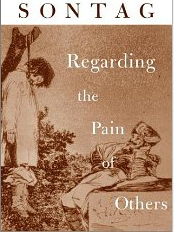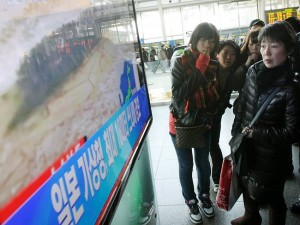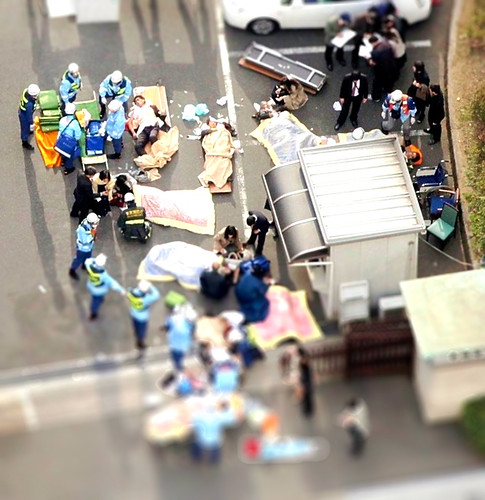Contemplating Empathy, Early This Morning After the Earthquake
 Last night I began reading a long essay, Regarding the Pain of Others, by Susan Sontag. The work dates to 1993, and centers on the power of photographs of war. She considers Virginia Woolf’s earlier reflections on horrific images from the Spanish Civil War, in Three Guineas.
Last night I began reading a long essay, Regarding the Pain of Others, by Susan Sontag. The work dates to 1993, and centers on the power of photographs of war. She considers Virginia Woolf’s earlier reflections on horrific images from the Spanish Civil War, in Three Guineas.
Sontag writes: “Not to be pained by these pictures, not to recoil from them, not to strive to abolish what causes this havoc…for Woolf, would be the reactions of a moral monster… Our failure is one of imagination, of empathy: we have failed to hold this reality in mind.”
This morning I awoke early and saw video of an earthquake rattling portions of Japan and a tsunami destroying broad swaths of land in a country where I’ve never been. I’m distracted by those images and while I’m trying to work on another subject, my mind flips back to what’s going on there, along the Pacific.
(from Flickr: Japanese Tsunami Victims, by Logan)
So it seems like the right day to review some basics on empathy. I hope my readers won’t mind if this part is too simple. It’s just that the word is thrown around so often lately, in places like Twitter and Time Magazine, on doctors and compassionate health care; I should remind myself if no one else exactly what empathy is supposed to be.
First, a distinction: Sympathy usually refers to feelings elicited upon a mutual or shared experience; empathy involves understanding another’s experience.
A post on KevinMD by Barbara Ficarra, a few months back, led me to a 2003 academic review on empathy in clinical medicine, by Jodi Halpern, MD, PhD, who writes:
…Outside the field of medicine, empathy is an essentially affective mode of understanding. Empathy involves being moved by another’s experiences. In contrast, a leading group from the Society for General Internal Medicine defines empathy as “the act of correctly acknowledging the emotional state of another without experiencing that state oneself.”3
Halpern explains the difference between empathy and sympathy, with a distinction I was taught in a rudimentary ethics class in medical school:
This recent definition is consistent with the medical literature of the twentieth century, which defines a special professional empathy as purely cognitive, contrasting it with sympathy. Sympathetic physicians risk over-identifying with patients…
Th open-text article in the Journal of General Internal Medicine (18: 670–674, 2003) is well-worth the full read.
Meanwhile I’ve discovered measurable criteria for physicians’ empathy, the so-called Jefferson Scale of Empathy. From the Science Daily (via the Tweet, above) on a report in the journal Academic Medicine:
Researchers used the Jefferson Scale of Empathy (JSE) — developed in 2001 as an instrument to measure empathy in the context of medical education and patient care. This validated instrument relies on the definition of empathy in the context of patient care as a predominately cognitive attribute that involves an understanding and an intention to help. The scale includes 20 items answered on a seven-point Likert-type scale (strongly agree = 7, strongly disagree = 1)…
This sort of empathy rating system seems strange to me, even alienating; it’s plainly too numerical.
I’d rather stick with my feelings, and stare at today’s photographs and videos, and finish reading Sontag’s notes on The Pain of Others, this evening.

—-
ADVERTISEMENTS:

Have you read Born for Love: Why Empathy is essential — and endangered? This book was written by Maia Szalavitz and Bruce Perry (Maia often comes to tweet-ups) and is at the very top of my reading list. Based on my conversations with Maia, I am confident that this book is well worth reading. Empathy is KEY to human relationships and sadly undervalued in our culture.
Thanks, I wasn’t aware of that book, and will look into it. Although I do have a tall stack…and lately I can’t keep my eyes from the unfolding, unfortunate news. But I will –
Regarding the pain of others. Such a wonderful and disturbing book. Empathy really is the key to relationships and the sustainability of the societal order. To understand someone’s pain, to imagine it, to reach out, to ask about what works and what doesn’t, to think about long term solutions to the pain of a community – this is what makes a just society. We see it in disaster. Yet, the disasters of modern living are alive and well every day. I hope we’ll learn.
Thanks Gayle, I agree, hope for the same. Find it hard to reconcile such large-scale disasters with personal-private grief.